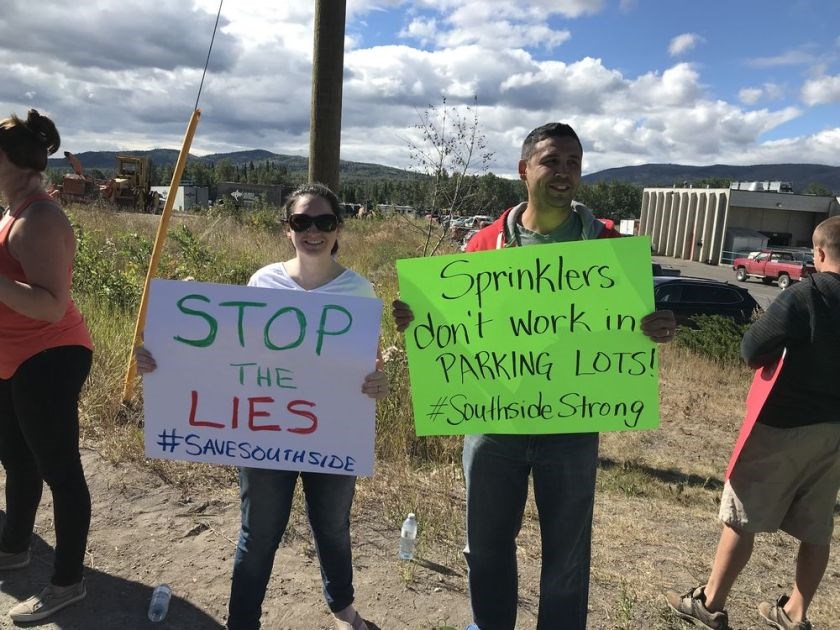Protesters on Saturday surrounded trucks loaded with firefighting gear in Burns Lake before the drivers left after being denied ferry access to the nearby Southside of Francois Lake, where evacuation holdouts are struggling to protect their homes from Central Interior wildfires.
More than 50 people assembled to show disappointment that the 28 trucks loaded with sprinklers, hoses and other gear sat idle in a grocery store parking lot for the past few days. The truckers, most of them from Alberta, had tried to access Southside communities threatened by the Babine Complex wildfire, which includes the 85,400-hectare Nadina Lake and 31,500-hectare Verdun Mountain fires.
Burns Lake councillor Charlie Rensby said he was “beyond infuriated and frustrated” at the situation that led to the truckers leaving. He believes the B.C. Wildfire Service and contractors are being prevented from doing their jobs effectively because of provincial red tape.
“Honestly, I feel like the government has turned its back on our community,” said Rensby, who joined the protest. “I feel like our people are not being respected and that they’re trying to talk to us like we’re children, and that we don’t understand, when most of us have grown up fighting big fires in our area.”
Rensby said he and other members of a disaster relief group called The Postmen have been discouraged by officials from bringing food, diapers and other supplies to Southside holdouts as their resources dwindle.
“It’s like watching a train wreck happen in slow motion,” he said. “There’s all these conductors who can throw on the brakes but it seems like either their hands are tied, or there’s government liability and insurance issues.”
Ebony Griffin, an information officer with the B.C. Wildfire Service, said the service was aware of the protest and stressed that it is looking into more effective responses to the Babine Complex.
“I think right now, emotions are really high,” she said. “These are people’s livelihoods that are at stake and so anything that will help, they want over there.
“What we really want to stress is that just because a tool looks and sounds great, it doesn’t necessarily mean it would be great as an application on this fire.”
Griffin explained that a contractor had recently brought a high-capacity water delivery system to Burns Lake to see if it could be used against the fire. But based on the contractor’s knowledge of his equipment, they determined that his system — which requires proximity to large bodies of water, a short distance between structures and relatively flat terrain — wasn’t appropriate for the job, Griffin said.
“That being said, B.C. Wildfire Service is still looking into possibly smaller to medium-size water delivery systems that could be a lot more effective in these areas,” she said.
Ginger Moyah, 38, a teacher and lifelong Southside resident, helped organize the protest. Moyah said she understands why the truckers ended up leaving but is frustrated they didn’t get a chance to try to help.
“I just feel like there’s a lot of talk and not enough action,” she said. “Those trucks have moved on now. I feel like we’ve lost homes due to not using the resources that we have.”
Moyah said her family has been blocked from sending supplies via the ferry to other family members who have chosen to stay on the Southside, including parts for a bulldozer they are using to protect their home from wildfire.
“You basically have to smuggle supplies over the lake so that they can keep going,” she said. “People have to act like criminals so that they can save their homes.”
Longtime “Southsider” Mike Robertson, 62, said access to his community has been sporadic. Last week, residents weren’t allowed to bring fuel to crews or supplies to those who chose to stay but on Saturday they were allowed to.
He said residents have struggled to get permits to shuttle supplies across using a ferry, which is the main point of access while most roads are closed.
“It’s turning people into criminals, it’s turning people into liars,” he said. “We’re having to disguise ourselves to get over there, it seems like.”
Robertson said that while he understands the truckers’ decision to leave once they understood that the Babine Complex and local topography were “beyond their scale,” he believes locals, many of whom have been fighting wildfires all their lives, should be able to protect their livelihoods. In his case, the wildfire threatens his 650-acre farm near Mollice Lake.
“I can stand the losses,” he said. “What hurts me is the changing landscape and of course the personal loss that has already occurred. The big picture here is we’re losing our way of life, which is primarily tied to the logging industry,” along with ranching and farming, he added.



